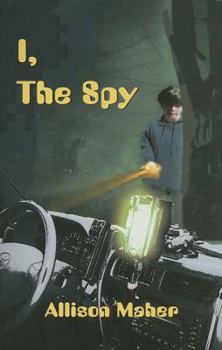I, The Spy
Fifteen-year-old Andrew has cool parents: his mother's job is to discover and test electronic surveillance gear and covert law enforcement equipment; while his father is an environmental biologist and cook. What vaults Andrew and his family into action is a new guy, Brian Fiske; he shows up in their small village of Aylesworth with a very dark secret.
Brian and his family are in the witness-protection program and are now in relocation. However, when the mobsters that Brian's family have put into prison come looking for revenge and kidnap them, the adventure is on.
Armed only with their intelligence and high-tech gadgetry, Brian and Andrew must find a way to foil the kidnapers and find safety. Andrew's instincts -- along with his mother's electronic skills and his father's biological savvy -- lead him on a suspenseful rescue mission that could end up in success or disaster. The measure of success will be in their ability to take responsibility for others and act quickly.
This often lyrical and always thought-provoking memoir asks questions that confront many of us: What do we know, for sure, about our childhoods? Does a lively imagination enrich a life or blind us to opportunities? What choices shaped the path our lives have followed? In thirty short chapters, Jo-Ann Wallace take us on a journey from girlhood to elderhood, from one conundrum to another, with the crackle of synaptic energy flashing in the gaps -- in what isn't revealed, isn't told.
The book parachutes us into working-class English Montreal in the 1950s and 1960s, into young womanhood in Toronto in the late 1970s and early 1980s, and then into professional life in Edmonton from the 1980s through the 2000s. "White Swan, Black Swan" delves into childhood games, and how the subconscious power dynamic between a younger and an older sister lets their imaginations fly free of their small shared bedroom. "Melmac" starts with that quintessentially mid-century dinnerware rattling around in an old motorhome as the author ponders the obsessive collecting of objects as a quirky coping strategy, an outlet for the stresses of contemporary working life. "Whimsy" takes us from the classic Jimmy Stewart movie "Harvey," with its 6 foot 3 1/2 inch rabbit to her own imaginary childhood friend, a Scottie dog, and to a present friend who will not watch any movie based in "whimsy." What dangers arise, the author wonders, when imaginations go unexamined, and unexercised.
The many disparate pieces of the author's life are like an intricately worked mosaic, while the title, A Life in Pieces, foreshadows the final chapters that unfold with tenderness and awe in the wake of a cancer diagnosis.





